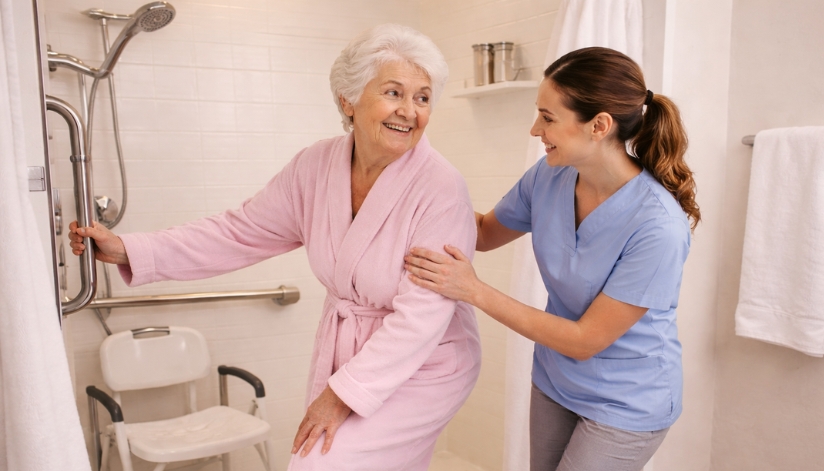Tips For Staying Healthy This Fall And Winter
With the winter season just weeks away, it’s more important than ever for residents of The Neighbors of Dunn County and their loved ones to take proactive steps to stay healthy. Seasonal illnesses like the flu, respiratory infections, and even COVID-19 tend to spike during the colder months, especially in shared environments like nursing homes. Fortunately, with proper planning, awareness, and support, residents can enjoy the colder seasons while minimizing health risks.
Below, we’ve outlined some essential ways to promote health, comfort, and safety through fall and winter, especially for elderly individuals living in long-term care communities. Whether you’re a resident or a family member, these steps can help you navigate the season with confidence.
Protecting Our Community During Flu Season
One of the most important ways we protected residents and staff this season was through our annual flu shot clinics. These typically begin in October and are administered as soon as our pharmacy partners deliver the vaccines. While there are no set dates, our team ensures all eligible residents and staff have the opportunity to receive the vaccine.
According to the Centers for Disease Control and Prevention (CDC), everyone aged six months or older should get a flu shot each year. For seniors, especially those in nursing homes, the vaccine is critical. It helps reduce the risk of serious illness, hospitalization, and death from the flu. Mayo Clinic echoes this guidance, reinforcing that the flu vaccine can significantly lower the chance of complications.
Nutrition For A Strong Immune System
Good nutrition plays a vital role in keeping the immune system strong and resilient. During fall and winter, it’s especially important for elderly residents to get enough vitamins and minerals to help fight off infections and maintain energy levels.
Our dietary and kitchen staff work hard every day to ensure meals are not only delicious but also nutrient-rich and tailored to residents’ specific dietary needs. Foods high in vitamin C (like citrus fruits and bell peppers), vitamin D (like fortified dairy), and zinc (found in beans, meats, and whole grains) are particularly helpful in boosting immunity.
For residents who may have a reduced appetite or difficulty eating due to medical conditions, our dietary team offers personalized support to ensure nutritional needs are still being met through nutrient-dense, easy-to-enjoy meals. It’s all part of our commitment to holistic, individualized care.
Hydration In Colder Weather
People often associate dehydration with hot summer months, but seniors are also at risk of becoming dehydrated in colder weather. The body’s thirst response tends to decrease with age, and heating systems can cause dry indoor air that contributes to water loss.
To stay hydrated, residents should be encouraged to drink water throughout the day, even when they don’t feel thirsty. Warm beverages like herbal tea, broth-based soups, or decaffeinated coffee can also provide hydration while offering comfort during chilly days. Our team ensures fluids are regularly offered during meals and activities to help prevent dehydration and its related complications.
Dress For The Weather And Keep Warm
Colder weather can pose risks such as hypothermia, especially for older adults who may have difficulty regulating body temperature. Layering is the best way to dress in fall and winter, and residents should be equipped with warm sweaters, socks, scarves, and jackets when spending time outdoors or in cooler indoor spaces.
Families can help by making sure their loved ones have comfortable, well-fitting cold-weather clothing available at the facility. Our staff is always ready to assist residents with dressing appropriately and ensuring their rooms are kept at a comfortable temperature.
Staying Active Indoors
Physical activity remains important during the fall and winter months, even when outdoor activities may be limited. Regular movement can help maintain flexibility, circulation, balance, and even mental well-being.
At The Neighbors of Dunn County, we offer a variety of safe indoor activities that encourage movement while also providing fun and social engagement. Chair yoga, stretching, music-based movement, and hallway walks are just a few of the ways residents can stay active in a climate-controlled environment.
If a resident has specific mobility concerns, our therapy staff can develop a modified activity plan to keep them moving safely and comfortably throughout the season.
Preventing The Spread Of Germs
In addition to flu vaccinations, we continue to follow best practices for infection control to keep everyone safe. Here are a few ways residents and visitors can help prevent the spread of seasonal illnesses:
Practice good hand hygiene. Wash hands often with soap and water or use hand sanitizer.
Avoid visiting if sick. Family members who are experiencing symptoms of a cold, flu, or other illness should wait until they’re feeling better to visit.
Wear masks when needed. In times of elevated illness transmission, masks may be encouraged or required to protect vulnerable residents.
Cover coughs and sneezes. Tissues and hand sanitizer are available throughout the building to encourage proper hygiene.
Our staff members receive ongoing training in infection prevention and work diligently to maintain a clean, safe environment for all.
Mental And Emotional Health In The Winter Months
The colder months often mean shorter days, less sunlight, and more time spent indoors. For some residents, this can lead to feelings of isolation or seasonal depression. That’s why our activities staff works hard to keep spirits high with a full calendar of engaging events, games, crafts, and social opportunities.
We also encourage family and friends to visit or stay connected through phone calls, video chats, or cards and letters. Social support plays a key role in emotional well-being during the winter season.
If a resident seems withdrawn or down, our care team is always ready to check in and provide additional support or resources.
A Shared Commitment To Health And Comfort
Staying healthy during fall and winter is a team effort. At The Neighbors of Dunn County, our staff, residents, and families work together to create a warm, supportive environment where everyone feels safe, nourished, and cared for. From flu shot clinics and personalized meals to cozy indoor activities and emotional support, we’re committed to whole-person care—whatever the season may bring.
If you have questions about flu clinics, nutrition, or any other aspect of our care services, we’re here to help. Please contact our team at The Neighbors of Dunn County. We look forward to supporting you and your loved ones through a safe, healthy fall and winter season.




